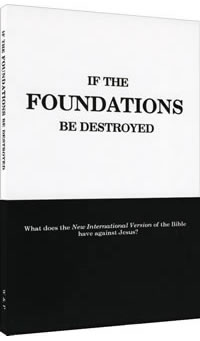Is the King James Bible All Wrong About Death and Hell?
By David W. Daniels
Is it true? Is the King James Bible a goldmine for groups that don`t believe in hell? After all that I have said about the new Bibles removing the word "hell" and some of the words about hell, I was amazed to find out a new accusation: That the King James is dangerous because of the times it doesn`t translate the Hebrew Sheol or the Greek Hades as hell! And that the cultists just love to use the King James because of this supposed "mistake."
Well, the accusation is just wrong. Satan sure hates the King James Version. Is there no limit to the lies he will cook up about it?
They can`t be talking about the New Testament. Hades only appears in the New Testament 11 times. And 10 times it is translated "hell." Just one time it is translated "grave:" 1 Corinthians 15:55: "O death, where is thy sting? O grave (hades), where is thy victory?"
Look at the context! This is talking about the afterlife, but it`s not about torments of hell as we English-speakers understand it —which is always negative. The translators chose to use the word "grave," to describe being put in the ground, to descend into the afterlife, whether to paradise, "Abraham`s bosom," or torments —what we call "hell."
1 Corinthians 15:55 is a direct reference to Hosea 13:14. "I will ransom them from the power of the grave; I will redeem them from death: O death, I will be thy plagues; O grave, I will be thy destruction..." Grave, of course, is "Sheol" in the Old Testament because it was written in Hebrew.
Believe it or not, that was something the King James translators didn`t have to fix. 36 years before King James, the Bishops Bible translated Hebrew "Sheol" and Greek "Hades" the same way, with the same words. The Bishops Bible translators had already gotten that right!
"Okay," you say. "But what about the 31 verses in the Old Testament that Sheol was translated 'the grave`?"
Great question. Totally fair. So let`s look at the very first time the King James translators ever translated Sheol as "the grave" instead of "hell." Genesis 37:35. "And all his sons and all his daughters rose up to comfort him; but he refused to be comforted; and he said, For I will go down into the grave unto my son mourning. Thus his father wept for him." The word for "grave" here is Sheol. Jacob didn`t mean he was expecting hell —he`s referring to death. Again, you`ve got to look at the context.
But why fault just the King James? There are 15 other versions, 5 of them Jewish, that translate Sheol as "the grave" in this verse including: The NIV (1984 and 2011), The New Living Translation (1996, 2004, 2007), The New King James (1982); 5 Jewish Bibles, including The Complete Jewish Bible (1998), Jewish Publication Society (JPS) 1917, and the Rabbi Isaac Leeser Bible (1853).
So you see, translating Sheol and Hades by two words, "hell" and "the grave," depending on the context, is nothing new. We have lots of words in English that have more than one meaning, depending upon how they`re used.
Other Bible versions are the ones at fault when they minimize hell by leaving Sheol and Hades untranslated, with "hell" in the Bible only a few times, or as some do leave it out altogether!
Which would you rather have: A Bible that removes "hell" altogether, and refuses to translate the Hebrew Sheol and the Greek Hades? Or one that has a lot of "hell" in it? I want everyone to avoid hell at all costs. So I`ve made my choice. How about you?
- See more articles on related topics:
- Bible Versions
- King James Bible
- Changes in Bible Versions
- Modern Versions
Other Articles from January/February 2016:
- Chick Tracts Are Extending the Reach of Missionaries Worldwide
- Terrorism Must Be Answered With Revival
- No Sowing - No Harvest
- Just A 'T' Too Far
- Are Modern Bibles Built on a Faulty Foundation?
- Recent Court Cases Approve Public Witnessing
- An Open Mission Field Next Door
- Church Planting Made Easier With Chick Tracts
- Message From Jack Chick January/February 2016
- Chick Mail Bag January/February 2016
More on Bible Versions:
Products of Interest:
-

Look What's Missing!
256 pages
For years, publishers have been removing words, and even whole verses, from modern Bibles. What's missing from your Bible? Take a look! -

Why They Changed the Bible
228 pages
See who is behind the gradual changing of modern Bibles. There’s no guessing about what these people believe. They will tell you, in their own words! -

Answers to Your Bible Version Questions
224 pages
David W. Daniels answers difficult questions about the KJV. Learn how to defend the KJV and why you can trust it. -

If The Foundations Be Destroyed
98 pages
What does the NIV have against Jesus? Is your Bible missing important verses and doctrines? If it is an New International Version there's a lot missing!



